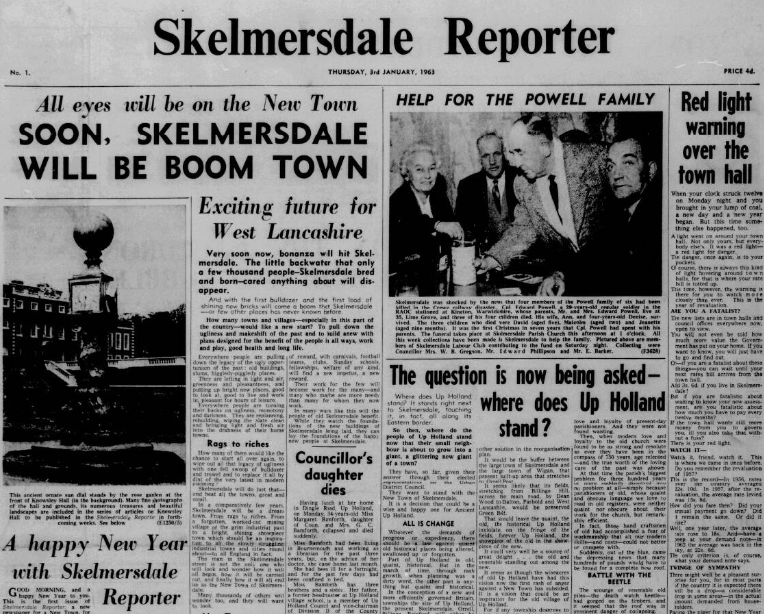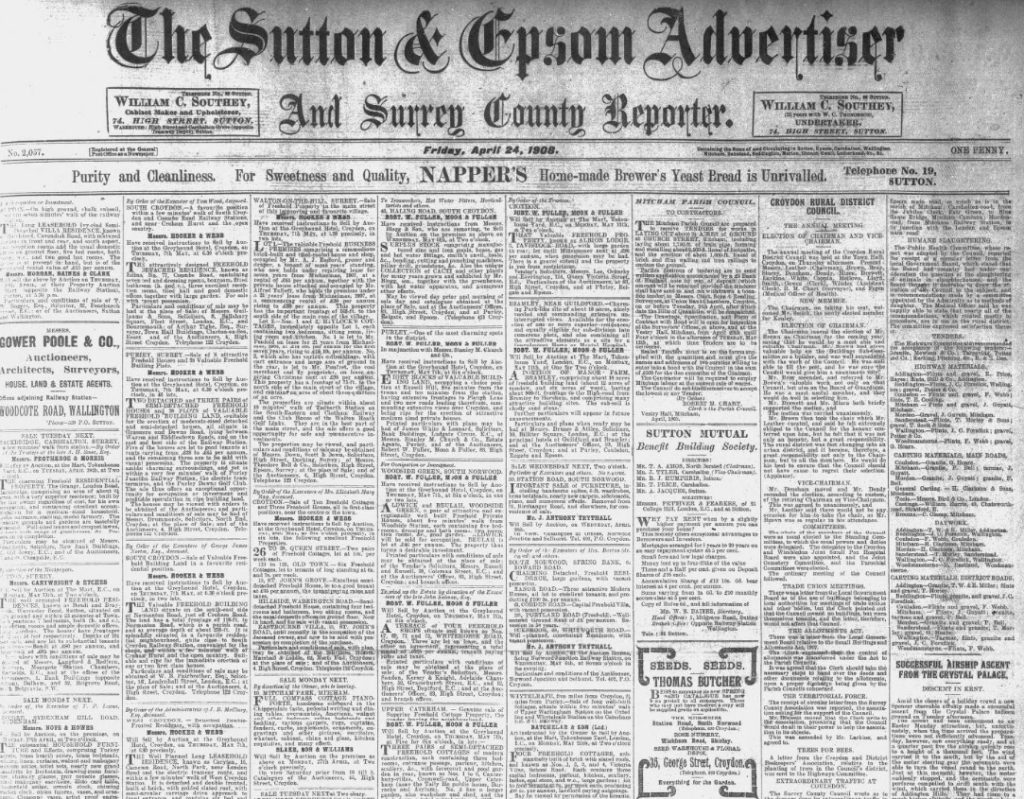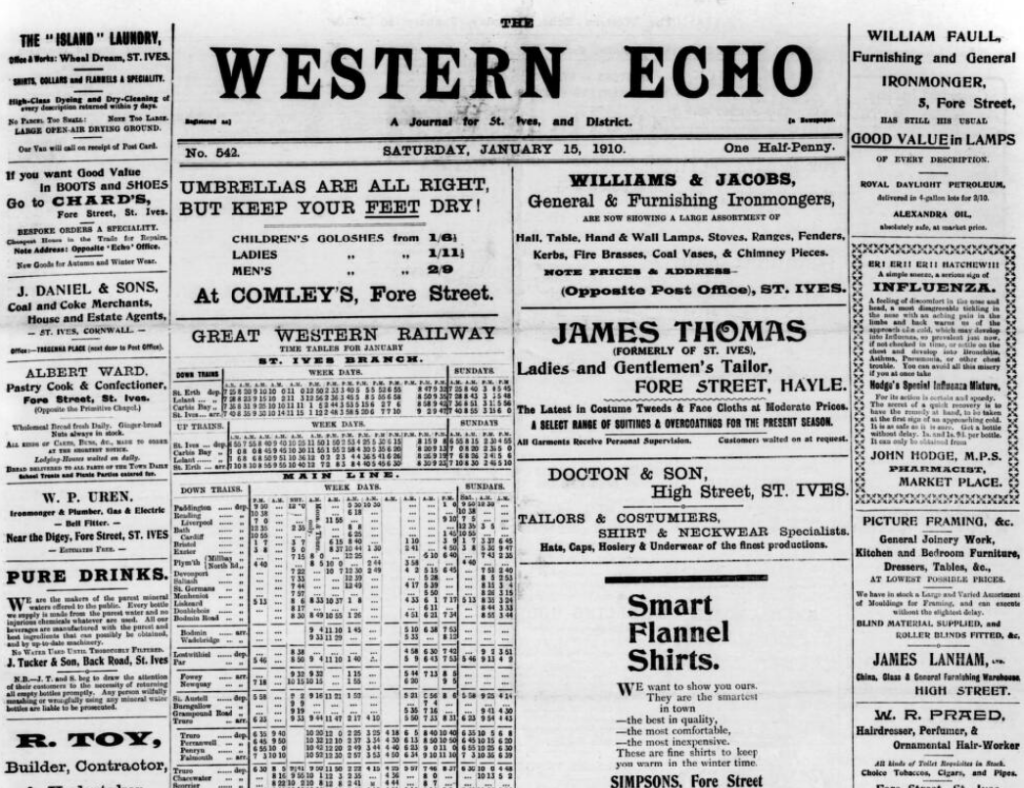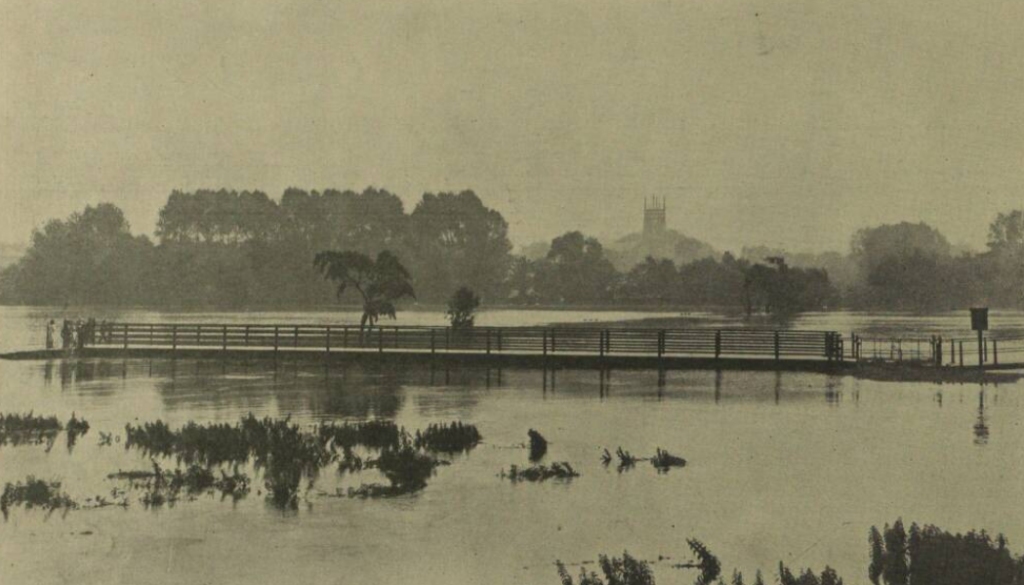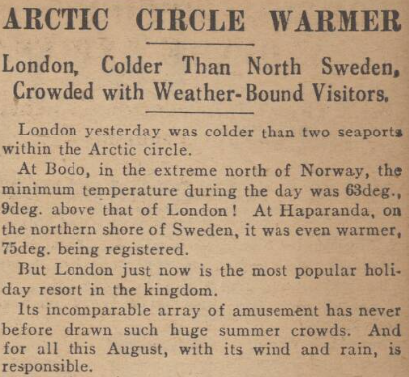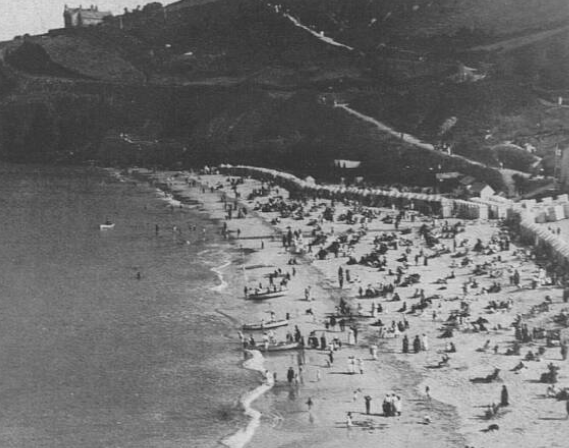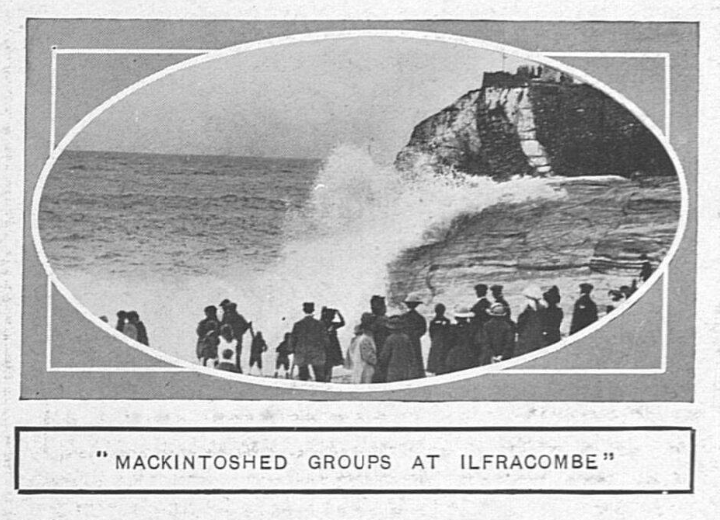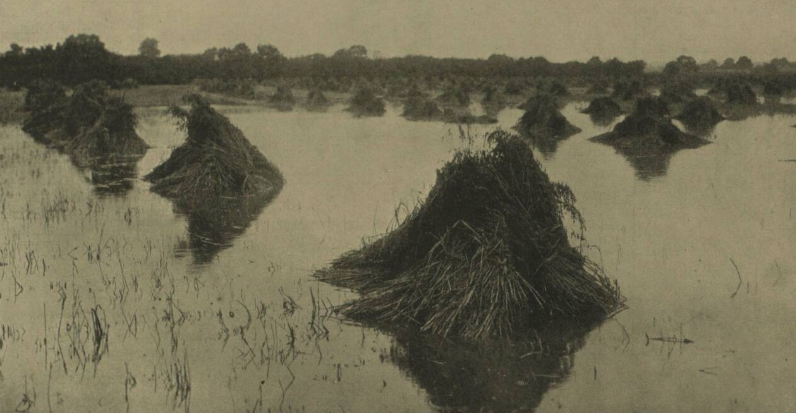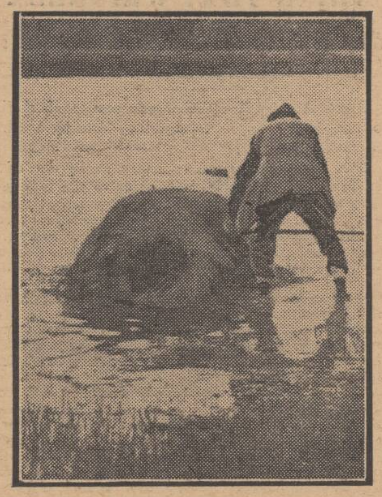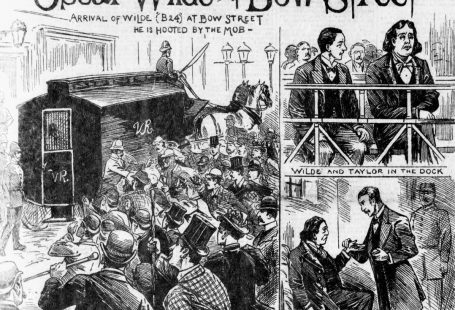As we come to the end of August we have a bumper week for you here at The Archive, as we have added 265,138 brand new pages, and we explore one of the wettest Augusts on record, that of 1912. Meanwhile, we’ve added three brand new titles for you, from London, Lancashire and Cornwall, whilst from Bath to Belfast, from Hinckley to Holyhead, from Paddington to Portsmouth, we’ve updated 31 of our existing titles.
So read on to discover more about our new and updated titles of the week, and also to learn about one of the wettest Augusts on record.
Register now and explore the Archive
Our first stop on our tour through our trio of new titles is in Lancashire, with the Skelmersdale Reporter, which was first published on 3 January 1963 at the cost of four pence. The founding of this newspaper coincided with the town’s redevelopment as a second wave new town, although Skelmersdale can trace its origins to hundreds of years before, having been featured in the Doomsday Book.
Indeed, the newspaper’s first edition addressed its links with the development of the new town, its inaugural editorial stating how ‘this is the first issue of the Skelmersdale Reporter, a new newspaper for a New Town, for the old town, and for all the surrounding districts of West Lancashire.’ Furthermore, the editorial went on to promise how:
The Reporter aims to provide for its readers a comprehensive service of news, views and photographs of the Skelmersdale, Up Holland and West Lancashire scene. In addition, many feature stories are planned which will be of special interest to the people of Skelmersdale, Up Holland, and all the towns and villages of the surrounding area.
The Skelmersdale Reporter was published every Thursday, and filled eight pages.
From Lancashire to London now, and our next new newspaper title of the week, which is the Sutton & Epsom Advertiser. The Sutton & Epsom Advertiser was founded in 1869 as a politically neutral title, and circulated in ‘Sutton, Epsom, Carshalton, Mitcham, and the surrounding villages in mid-Surrey.’
Filling eight pages, its focus was predominately local news, as the newspaper published the latest from the likes of the Carshalton Urban District Council, the Mitcham Parish Council, and the Croydon Borough Bench. The Sutton & Epsom Advertiser also took a look at inquests at Mitcham, as well as ‘Mitcham cases at the quarter sessions.’ Meanwhile, the paper published the latest football news, and had a particular focus on local team Crystal Palace.
In 1908 the penny paper changed its name to the Sutton Advertiser, whilst from 1928 to 1982 it became known as the Sutton & Cheam Advertiser. Change was again afoot in 1988 when the title relaunched as The Post in Sutton, before finally becoming the Sutton Post in 1989. The newspaper sadly closed in May 2010.
Our final new title of the week hails from St Ives, Cornwall and it is the Western Echo, which was a ‘journal for St. Ives, Hayle and District.’ This title was established in the seaside resort and port of St Ives in 1899 by William J. Jacobs, its debut edition stating how:
It is the usual practice for an Editor, in making his bow to the public, to offer an apology in justification of the new venture, and also to outline its policy. We shall take the liberty of breaking away from the time-honoured custom, and content ourselves with stating that this paper is started, not in the interests of any party or faction, but in the ‘common interests of every man.’
Filling four pages, and appearing every Saturday, the Western Echo was first published on 2 September 1899 at the cost of just one halfpenny. Its four pages packed a punch; covering everything from football gossip to poetry, from national news to featuring a Ladies’ Column. The title also published detailed news from the area, reporting on the latest from the St Ives Police Court, the St Ives Regatta, the St Ives Football Club, the St Ives Post Office, and the St Ives Wesleyan School.
True to its commitment to the seaside town, the Western Echo also printed the latest from the local fishery, high water tables, and a shipping list.
In 1957 the title was merged with the St Ives Weekly Times, which was established in 1910, to become the St Ives Times & Echo. The St Ives Times & Echo is still published to this day.
We’ll come back to the Western Times to take a look at one of the wettest Augusts on record, but for now let’s explore some of the wonderful newspaper titles that we have updated this week. Our biggest update this week is the Gloucester Citizen, to which we have added over 56,000 brand new pages, whilst this week also sees significant updates to the Manchester Evening News, to which we have added over 28,000 brand new pages. Meanwhile, over 18,000 brand new pages have joined the Rochdale Observer, the Widnes Weekly News and District Reporter, and the Portsmouth Evening News.
We have also made significant updates to some of our more historic newspaper titles, with the years 1772 to 1821 joining the Bath Journal, the years 1770 to 1812 joining the Cambridge Chronicle and Journal, and the years 1749 to 1828 joining the Sherborne Mercury. Finally, we have updated one of our Welsh titles, namely the Holyhead Mail and Anglesey Herald, and more pages have joined the Belfast News-Letter too.
A Look At One of the Wettest Augusts on Record
Hot on the heels of the heatwave of 1911, the August of 1912 was one of the wettest Augusts on record. Indeed, the August of 1912 is known as being one of the wettest, coldest and dullest Augusts ever recorded in the United Kingdom, even witnessing the great Norfolk flood, which occurred on 26 August 1912.
Using our new title the Western Echo, this week we take a look at one of the wettest Augusts ever experienced in Britain, and its impact upon both the country and the town of St Ives.
On 24 August 1912 the Western Echo surveyed the holiday season, reporting how:
Despite the unfortunate weather a considerable number of visitors remain at St. Ives. Every morning large crowds may be seen enjoying a dip in the briny at Porthminster Beach, but the wet and stormy weather during August has been most disastrous to all concerned.
The wet weather meant that ‘pleasure excursions by train and coach have been sadly interfered with, and on many days boating has been out of the question.’ A week later, and the economic impact of the wet weather was being felt keenly by the seaside resort. The Western Echo reported how:
Unfortunately the exceptionally wet weather has had a disastrous effect on the holiday season, not only at St. Ives, but all over the country. Judging by the newspaper reports, however, it seems that West Cornwall has not suffered so badly as many other places. Large numbers of visitors have curtailed their holidays on account of the weather and left for home, and the bookings by the Cornish Riviera Express for Saturday morning are exceptionally heavy.
Sadly, it was reported how ‘from all quarters we hear complaints of losses, and many of the traders, and those who cater for holiday excursions have been badly hit.’ But it was the farmers who were set to suffer the most, ‘owing to the damage to the hay and corn crops.’
On 14 September 1912 the Western Echo detailed the impact that the wet summer had had on the ‘crops in the West,’ following the issue of a report from the Board of Agriculture. The report stated how ‘the wet weather has seriously affected the corn crops,’ going on to explain how:
A good deal of wheat has been cut throughout the division, but not much has yet been secured. The condition is bad; the grain is sprouting and rapidly deteriorating, and the yield is expected to be considerably below the average. Barley has been badly laid by the storms, and the grain has become stained and sprouted; very little has yet been secured, and the yield is not likely to reach an average. Oats have also suffered similarly, and will be very difficult to cut: the crop is considerably below the average.
Potatoes, meanwhile, were said to be ‘badly diseased in nearly all districts of the division,’ the division being Devon and Cornwall, whilst ‘turnips and swedes have made very little growth during the month owing to the excessive wet and lack of sunshine.’ As the Western Echo anticipated back in August, ‘much hay’ had rotten away in the fields.
Some positives from the wet August were to be seen, however, as the pastures were ‘generally full of grass,’ meaning that cattle were ‘for the most part…doing well.’ It was noted though, ‘how sheep and lambs would thrive better with warmer weather.’
Find out more about weather history, the history of agriculture, and much more besides, in the pages of our newspapers today.
New Titles
| Title | Years Added |
| Skelmersdale Reporter | 1963, 1965-1972, 1976-1978 |
| Sutton & Epsom Advertiser | 1908-1914, 1916-1928 |
| Western Echo | 1899-1903, 1906-1915 |
Updated Titles
This week we have updated 31 of our existing titles.
You can learn more about each of the titles we add to every week by clicking on their names. On each paper’s title page, you can read a FREE sample issue, learn more about our current holdings, and our plans for digitisation.
You can keep up to date with all the latest additions by visiting the recently added page. You can even look ahead to see what we’re going to add tomorrow.


